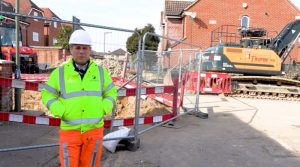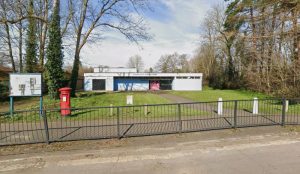A groundbreaking project testing how drones could be integrated into the UK’s 999 emergency response system to deliver defibrillators to out-of-hospital cardiac arrest patients has been launched by the University of Surrey, Air Ambulance Charity Kent Surrey Sussex, and the South East Coast Ambulance Service NHS Foundation Trust (SECAmb).
Funded by the National Institute for Health and Care Research (NIHR), the 16-month initiative will explore how drones can rapidly deliver Automated External Defibrillators (AEDs) to the scene of an emergency — potentially saving lives where every second counts.
The research will take place in two phases. The first will simulate 999 call handling, Air Traffic Control coordination, ambulance dispatch, and drone operations to develop and refine delivery procedures. The second will involve interviews with out-of-hospital cardiac arrest survivors, family members, emergency responders and members of the public to assess perceptions of drone technology, ease of use, and any concerns.
Dr Scott Munro, Lecturer in Paramedic Practice at the University of Surrey and project co-lead, said:
“This research is the first step towards integrating drone technology into our emergency response systems. Our ultimate goal is to develop and test the procedures needed to seamlessly introduce drone delivery of AEDs into the 999-emergency system.”
Professor Kevin Munro, Director of the NIHR Research for Patient Benefit Programme, added:
“Using drones to deliver defibrillators could help emergency teams reach patients faster, improve survival after cardiac arrest, and bring cutting-edge technology directly to the NHS frontline.”
Dr Craig Mortimer, Research Manager at SECAmb, said:
“Rapid intervention is vital in managing out-of-hospital cardiac arrests. Integrating this technology into future healthcare systems represents real progress in strengthening the chain of survival and giving patients the best chance of a positive outcome.”
With UK survival rates for out-of-hospital cardiac arrest currently below 10%, the research aims to tackle one of the biggest challenges in emergency care: getting a defibrillator to the patient in time.
About NIHR
The National Institute for Health and Care Research (NIHR) is the UK’s largest funder of health and social care research. It invests in high-quality studies that benefit the NHS, public health and social care, supports researchers and facilities, and partners with patients and communities to improve outcomes both in the UK and globally.













 Epsom Picturehouse, Epsom Square, Epsom, KT19 8AG
Epsom Picturehouse, Epsom Square, Epsom, KT19 8AG Tuesday 8 October, 6:30pm
Tuesday 8 October, 6:30pm  Tickets:
Tickets: 

